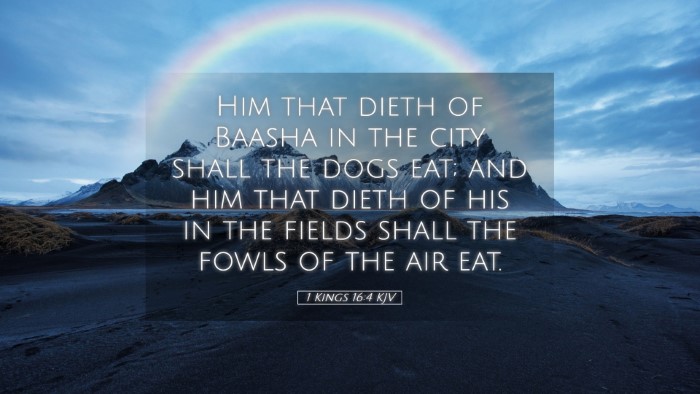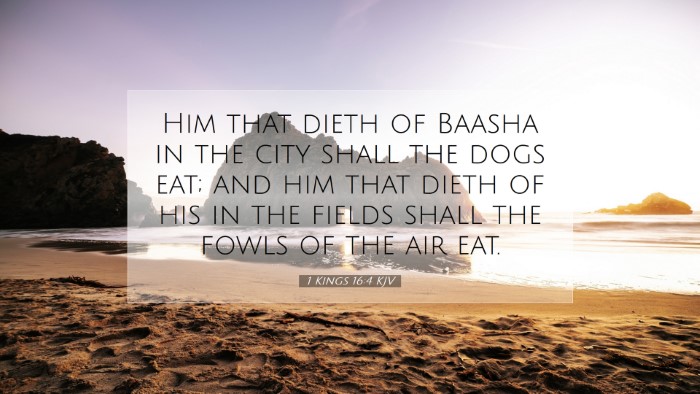Commentary on 1 Kings 16:4
1 Kings 16:4 states:
"He who dies of the house of Baasha in the city, the dogs shall eat; and he who dies in the field, the birds of the air shall eat."
Introduction
This verse encapsulates a grave declaration against the dynasty of Baasha, drawing attention to the judgment of God upon the wickedness of the Israelite kings and their abandonment of covenant faithfulness. The insights from various public domain commentaries will enhance understanding of this verse for pastors, students, theologians, and scholars.
Contextual Background
To fully appreciate the weight of this verse, one must comprehend the broader historical and theological context in which it is situated. Baasha, the king mentioned here, usurped the throne of Israel and led the people into idolatry, primarily through the worship of Baal.
Matthew Henry's Perspective
Matthew Henry highlights that this proclamation of doom is not merely political but profoundly spiritual. He notes that the disregard for God's commandments leads to disfavor. Henry emphasizes that the fate detailed in this passage serves as a divine warning, underscoring the seriousness with which God addresses unfaithfulness among His chosen.
Albert Barnes’ Interpretation
Albert Barnes offers specific linguistic insights into the phraseology used in this verse. He explains that the reference to the dogs eating the remains of those from the city and the birds of the air consuming those from the fields illustrates the utter disgrace and dishonor that would accompany death for Baasha’s house. It symbolically represents divine judgment and highlights the lack of burial, a significant aspect in ancient Near Eastern culture.
Adam Clarke’s Analysis
Adam Clarke elaborates on the cultural implications of this verse. He comments on how being left unburied was perceived as a severe curse and humiliation. Clarke discusses the prophetic nature of the verse, noting that it emphasizes the finality of God’s judgment and serves as a historical marker of divine retribution against those who lead others astray.
Theological Implications
This verse invites deeper theological reflection on God's justice and mercy. It demonstrates that:
- The Character of God: God remains just and faithful to His covenant, ensuring that sin ultimately faces consequences.
- The Consequences of Leadership: National leaders bear the weight of their actions, shaping the religious and moral fabric of the community.
- The Nature of Prophecy: The specificity of the prophecy reflects God's control over history and His foreknowledge of events.
Application for Today
1 Kings 16:4 provokes contemporary readers to consider the ramifications of their spiritual leadership and societal influence. The stark imagery employed by the biblical author serves as a reminder of the weighty responsibility that comes with authority.
Practical Reflections
For pastors and church leaders, it is essential to recognize the importance of faithfulness to the Word of God in stewardship roles. Acknowledging that the decisions made in leadership can lead others toward or away from God should compel leaders to seek divine wisdom and integrity.
Students and theologians are encouraged to study the patterns of sin and judgment throughout scripture, reinforcing the understanding of God's character as just yet merciful. This passage, representative of a larger biblical theme, invites inquiry into the nature of divine punishment and grace.
Conclusion
1 Kings 16:4 serves as a sobering reminder of the seriousness of spiritual fidelity and leadership accountability. The insights gleaned from Matthew Henry, Albert Barnes, and Adam Clarke collectively illustrate the multifaceted dimensions of God's judgment, the cultural implications of dishonor, and the ongoing relevance of this verse across generations.


